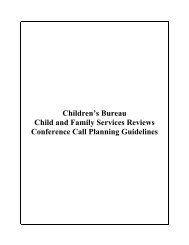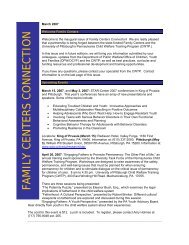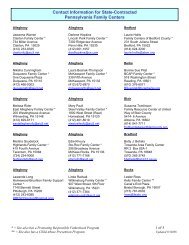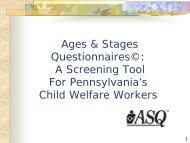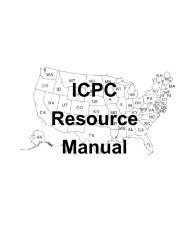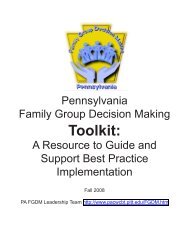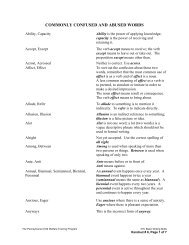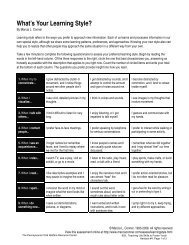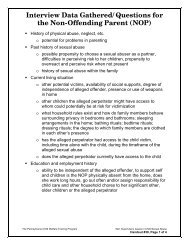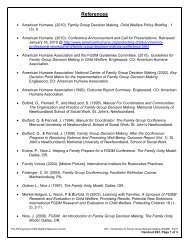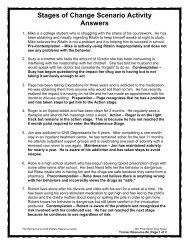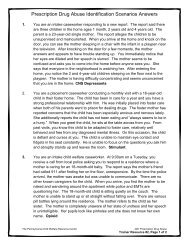December 2007 Family Center Newsletter - Pennsylvania Child ...
December 2007 Family Center Newsletter - Pennsylvania Child ...
December 2007 Family Center Newsletter - Pennsylvania Child ...
You also want an ePaper? Increase the reach of your titles
YUMPU automatically turns print PDFs into web optimized ePapers that Google loves.
PARENT MENTORS<br />
A program that matches former clients with parents new to the system is showing promise for<br />
increasing parent engagement and support. In Contra Costa County, CA, parents who have<br />
successfully navigated the child welfare system and reunited with their children are selected,<br />
hired, and trained as parent advocates who can work within the system to provide mentoring and<br />
support to other parents dealing with child welfare issues. This Parent Partners program is<br />
described in a recent article in <strong>Child</strong> Welfare.<br />
Trained Parent Partners are able to help parents new to the child welfare system by:<br />
• Sharing their own experiences and modeling appropriate and empowering behavior<br />
• Connecting parents with appropriate resources, often providing a personal contact<br />
• Serving as contacts at court hearings and team decision-making meetings<br />
• Serving as a link between parents and the child welfare system<br />
• Expanding the parents' social networks<br />
An extra benefit of the Parent Partners program is the impact it has made on child welfare staff<br />
and the agency's organizational climate. Having the paid Parent Partners on the staff and in<br />
nearby office cubicles has promoted more positive language about parents by caseworkers, as<br />
well as greater sensitivity to parent concerns and perspectives. This shift in attitudes may<br />
contribute to a more family-centered organization.<br />
Read about the Parent Partners program in "Closer to Home: Parent Mentors in <strong>Child</strong> Welfare,"<br />
by Edward Cohen and Linda Canan, in the September/October 2006 issue of <strong>Child</strong> Welfare. For<br />
information, visit the <strong>Child</strong> Welfare League of America website:<br />
www.cwla.org/articles/cwjabstracts.htm#0609<br />
Preparing Staff to Involve Youth and Families<br />
The National Collaboration for Youth and National Youth Development Learning Network offer<br />
free training activities (www.nydic.org/nydic/staffing/workforce) for preparing frontline youth<br />
workers in three key competency areas:<br />
• Involving and Empowering Youth<br />
• Cares for, Involves and Works with Families and Community<br />
• Advocates for the Rights of Disenfranchised Youth and Families<br />
Working with Immigrant <strong>Child</strong>ren, Youth and Families<br />
According to the last Census, one in five children in this country today is an immigrant or the child<br />
of an immigrant, and the number is rising. This guide from the National Collaboration for Youth<br />
offers the context of the immigrant youth experience and practical tips for hiring, developing and<br />
retaining staff to work with this population.<br />
www.nydic.org/nydic/staffing/workforce/PreparingStafftoWorkwithImmigrantYouth.htm<br />
Resources – Outcomes Development, Monitoring and Evaluation<br />
Screening and Assessment for <strong>Family</strong> Engagement, Retention, and Recovery<br />
The SAFERR monograph was developed in response to frequent requests from managers of<br />
child welfare agencies for a "tool" that caseworkers could use to screen parents for potential<br />
substance use disorders in order to make decisions about children's safety. Although research<br />
findings and practical experience have established that no single checklist yields the kind of<br />
information caseworkers need to make difficult decisions about whether children are safe, they<br />
have identified an array of screening instruments and practice principles that, if used<br />
appropriately, can provide timely information to guide those decisions. It also provides guidance<br />
on developing collaborative efforts to improve outcomes for families.<br />
http://ncadistore.samhsa.gov/catalog/productDetails.aspx?ProductID=17633<br />
<strong>Family</strong> <strong>Center</strong> <strong>Newsletter</strong> <strong>December</strong> <strong>2007</strong>



